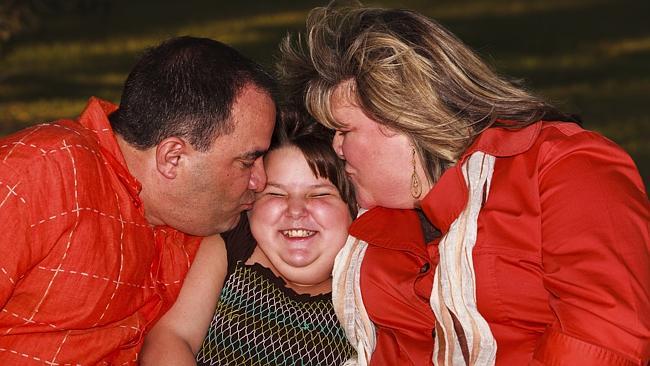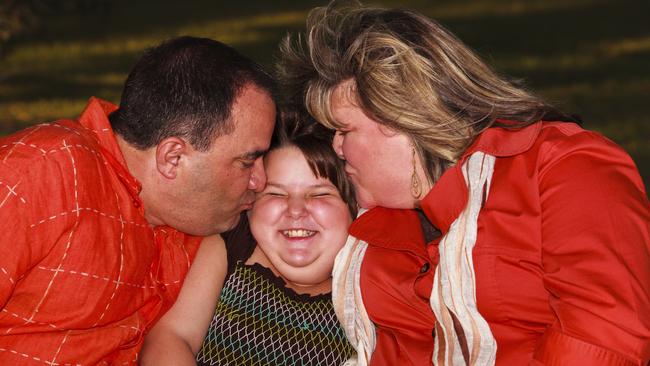Short and fat the awful truth about what junk food is doing to our kids
RESEARCHERS have made a shocking new finding about junk food: not only is it expanding the waistlines of our kids, it’s also stunting their growth.

Parenting
Don't miss out on the headlines from Parenting. Followed categories will be added to My News.
THE modern junk food diet has not only made 300 million kids worldwide overweight or obese — according to startling new research, it’s also stunting their growth.
The World Obesity Federation has found many children are shorter than normal but weigh more than they should even in first world countries like England.
The study published in The Lancet medical journal says poor diet and lack of exercise is to blame for the stunting.
The obesity researchers stumbled across the problem when they found children who had Body Mass Index measurements that indicated they were overweight or obese even though they actually had low body weight for their age.
“An apparent increase in prevalence of apparent overweight needs to be recognised as perhaps not entirely due to excess body weight per se, but could be confounded by low height for age,” the authors say.

The research found urban Indian children were 2.5cm shorter than the height the World Health Organisation recognised as normal.
RELATED: Single parents have fat kids
RELATED: Obesity risk begins before conception
In Mexico children were 6cm below the World Health Organisation reference.
Even in England the National School Measurement program found overweight kids from low income households were shorter than average.
“Results of a study in Vietnam found that 5 per cent of the overweight children were also stunted, and a study in São Paulo, Brazil, found that 6 per cent of children in low-income urban households showed excess body weight associated with stunting and that obesity associated with stunting was more common than obesity without stunting,” it says.
This highlights the importance of ensuring a supply of food that encourages healthy growth, and that is not jeopardised by the aggressive marketing of cheap, less nutritious products by multinational food companies, the study says.
Executive director of the Obesity Policy Coalition Jane Martin said the research provided further evidence that the food industry’s advertising to children had to be addressed.
“Children are consuming way to much excess discretionary food, two to four times the recommended limit in Australia,” Ms Martin said.

This week the coalition revealed McDonalds had written to schools encouraging them to have burgers, fries and desserts delivered to their students and was offering vouchers for burgers as reading encouragement awards.
A Cancer Council and Heart Foundation survey found 77 per cent of teenagers are spending more than two hours a day using electronic devices while only one in four were getting the 60 minutes exercise a day they needed.
Australia’s national health survey in 2011-12 found 25 per cent of kids and 62 per cent of adults were overweight.
The National Health and Medical Research Council says in the decade to 1995, 10—15 year-old girls increased their food consumption by 900 kilojoules per day and boys by 1,400 kilojoules per day.

“Without compensatory increases in physical activity, these changes are enough to have resulted in the significant observed increase in mean body weight,” it says.
The Lancet research has found that worldwide a staggering 114 million infants aged under 5 years are overweight, 81 million are overweight and 33 million of them fall into the obese range.
In total there were 300 million obese or overweight children aged under 18.
A further 1.3 billion adults around the world are overweight or obese.
The World Health Organisation has set a target of no increase in obesity rates by 2025 but the research finds progress towards this goal has been “unacceptably slow”.
Only one in four countries had implemented a policy on healthy eating by 2010.
In the United States children are eating on average 200 too many calories a day and this excess food is delivering a $20 billion a year bonanza for food companies, the research shows.
“Fat children are an investment in future sales,” said Dr Tim Lobstein from the World Obesity Federation and co-author of the series.

“A high proportion of these children will continue over-consuming through adulthood, creating a market for the US food and beverage industry, which we estimate to be worth considerably more than $60 billion each year,” the report says.
The Lancet researchers call for tighter supervision and international regulation of the food supply; an international code of food marketing to protect children’s health; regulating food nutritional quality in schools along with programs to encourage healthy food preferences; taxes on unhealthy products such as sweetened drinks and subsidies on healthier foods for low-income families.
Real change will depend on pressure from the public similar to the public pressure that saw smoking bans in public buildings, they conclude.
Originally published as Short and fat the awful truth about what junk food is doing to our kids



